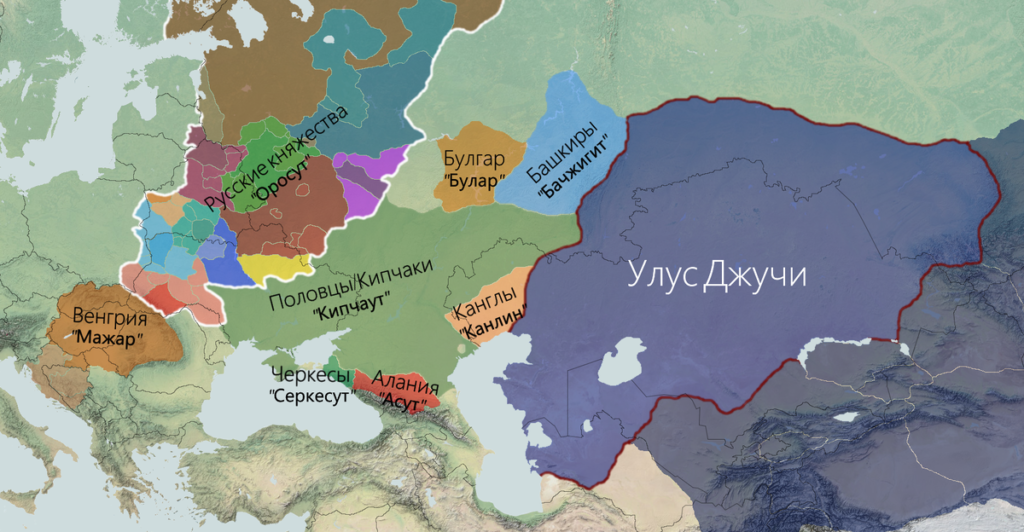Already soon after the proclamation of the ruler of all Mongols Genghis Khan allocated to his first-born son Dzhuchi a separate ulus — at that time under this word was understood rather people than lands. The second time the great khan divided the possessions shortly before the passing of his eldest and, as it turned out, his own death. After that he got the steppes near Desht-i-Kipchak, which was yet to be conquered.

Monument to Dzhuchi in Kazakhstan
After the death of Dzhuchi, his eldest son Orda-Ezhen at his own will refused the supremacy over his own line of Chingizids, despite the fact that he enjoyed considerable authority among the nomads. The main in a sort was recognized Batu who, however, served at a rate of the great khan while his brother remained in ulus and rules. Sovereign of Golden Horde it became only after Mongolian western campaign when Cumans steppes, the grounds of Volga Bulgars and Russia have been won.
Who is such Horde-Ezhen? Why about it almost nothing is known?
Orda-Ezhen became the first son of Djuchi and the first grandson of Genghis Khan, having been born in 1204. From the Mongolian language his name is translated as «master of the horde». His mother was Sarkadu-khatun from the tribe of Kungirats, who had long been linked to the Borjigins by marriage ties. The wives of Temujin, his father Yesugei and great-grandfather Khabul-khan, the first ruler of «all Mongols», were of Kungrat origin.
Orda-Ezhen was with his father when he was engaged in the subjugation of «forest peoples». And stayed with him when Juchi was going to fight for his primogeniture and the right to inherit the empire, and against him at the command of the great khan were troops led by other princes.
But at that moment something happened: the firstborn son of Genghis Khan suddenly said goodbye to his life — we still do not know for sure whether it was due to natural causes or was killed. And his own eldest son gave up power over the ulus in favor of his younger (in order — second) brother Batu.
Nevertheless, while Batu was at the court of the new great khan, waiting to be given an army to go to Desht-i-Kipchak, it was his eldest who stayed at home and ruled, gaining fame as a just and intelligent man. After the beginning of the western campaign, considerable contingents came under the command of Orda-Yezhen and three other senior Dzhuchids. And they themselves were considered the rulers of the «left wing» — so the Mongols named not only the corresponding flank of the army, but also the eastern part of the state as a whole.

Ulus Dzhuchi, the beginning of the
Horde Ezhen participated in the conquest of the Cumans steppe, Russia and the peoples of Volga Bulgaria. And when some Genghisids went east with their tumens, his men went to Poland as a diversion, while the main forces led by Batyi and Subudai fought in Hungary.
He was one of the architects of the victory over the Poles and Silesians at the Battle of Legnica, along with Chagataids Baidar and Kadan. He was forced to lift the siege of Breslau to prevent the Polish princes and the Bohemian king from joining forces. A smokescreen was used to cover the pretended retreat of Mangudai the dunce, and when the knights left their own infantry, the Christians were defeated piecemeal.
As has already been said, Horde-Ezhen received the eastern, «left» wing of the ulus Dzhuchi — his possessions were mainly located between Lake Balkhash and the Volga River. Whereas Batu Khan was considered to be in charge and occupied the steppes west of the Volga; Shiban and his offspring inherited Siberia; and the endowments of the other Dzhuchids are less certain, moreover, they could be changed.

In the decrees coming from Karakorum, the name of Horde-Jezhen was mentioned before that of Batyi. He often acted as his brother’s deputy, for example, when he pursued the interests of the Golden Horde in the election of the Great Khan in 1246. Very little is known about his descendants, but they, at least at first, were friendly to the Toluids in the Middle East and in the indigenous ulus of the Mongol Empire.
In all likelihood, the line of Orda-Ezhen descendants died out during the «internecine war». Although, according to tradition, it was from it that the Kazakh khans originated. But this version is not the only possible one.
